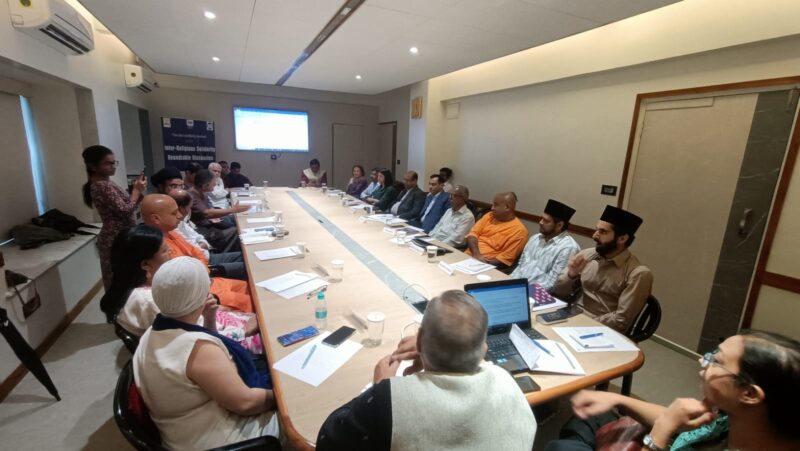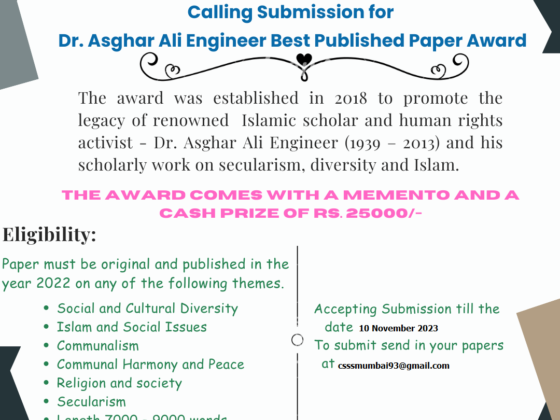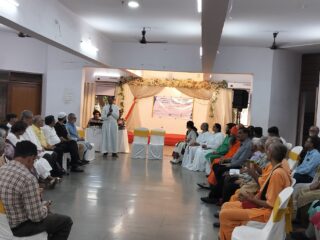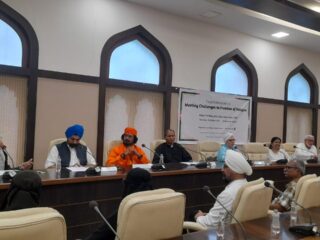Report of Inter-Religious Solidarity Round Table Discussion in Mumbai
Neha Dabhade
Vivekanand famously said during his speech at the World’s Parliament of Religions at Chicago in 1893, “As the different streams having their sources in different paths which men take through different tendencies, various though they appear, crooked or straight, all lead to Thee.” He went on to quote the Gita “Whosoever comes to Me, through whatsoever form, I reach him; all men are struggling through paths which in the end lead to me.” Swami Vivekanand believed that different religions are different paths leading to one God. Many thinkers have stressed on unity of religions. Maulana Azad like Sufi philosophers strongly believed in the doctrine of Wahdat-e- Deen meaning unity of religions – embracing universal values of all religions, which are common. The message of unity of religions where their core teachings are similar was reiterated by the participants that attended the Inter-Religious Solidarity round table discussion on 15th July, 2023. The participants comprised of 24 influencers, religious leaders, and leaders of faith communities who deliberated on the universal moral values of all religions. The round table discussion was organized by Centre for Study of Society and Secularism (CSSS), Citizens for the Constitution (CFTC) and Habitat and Livelihood Welfare Association (HALWA) against the backdrop of rising religious discord and intolerance in Mumbai. The objective of this discussion was to explore responses to intolerance and draw deeper into our collective shared values and morals propounded by religion to shape this response.
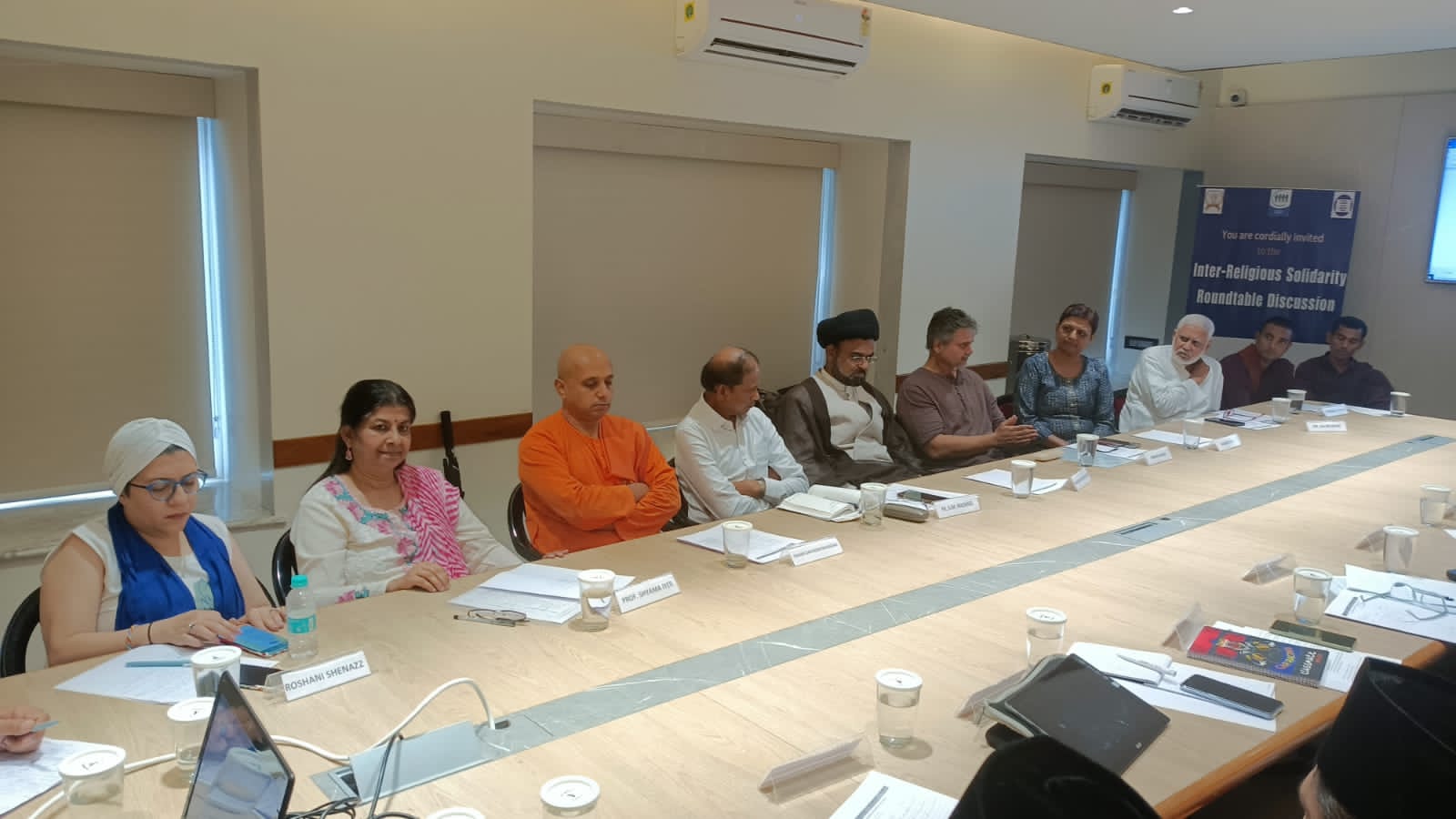 Salient points emerged from the rich discussion. Firstly, that the universal moral values of all religions are do not conflict with each other. The important values include love, compassion, respecting all lives, harming no one, and pursuit of truth. Prof. Shyama Iyer shared that Advait Vedanta in Hindu religion lays emphasis on truth. Swami Dayadhipananda from Ramkrishna Mission pointed out that introspection is quintessential to reach the truth. He stated that if one has to acquire divine consciousness, it is important to know one’s religion. More importantly, he stressed in order to realize divinity, path prescribed by any religion could be followed, only there has to be sincerity and truthfulness. Similarly, Dr. Salim Khan from Jamat-e-Islami stated that Islam and Quran don’t teach discrimination or injustice towards any human being including those following other religions as it believes that there is one creator and good deeds take us closer to the Supreme. Roshani Shenazz echoed the view of Dr. Khan where she shared that in Zoroastrian religion, the central values emphasize on “good words, good thoughts and good deeds”. She also made a significant point that religion is not static but evolves with the changing society. These changes make religion more relevant to the times it is practiced in. Manish Modi pointed out that in the Jain religion, human beings are expected to take responsibility of their own actions as there are multiple truths – each having their own interpretation emerging from their reality. He strongly urged that no religion can impose their practices or view points on the followers of other religions. He also pointed out interesting similarity between Arabic and Sanskrit grammar.
Salient points emerged from the rich discussion. Firstly, that the universal moral values of all religions are do not conflict with each other. The important values include love, compassion, respecting all lives, harming no one, and pursuit of truth. Prof. Shyama Iyer shared that Advait Vedanta in Hindu religion lays emphasis on truth. Swami Dayadhipananda from Ramkrishna Mission pointed out that introspection is quintessential to reach the truth. He stated that if one has to acquire divine consciousness, it is important to know one’s religion. More importantly, he stressed in order to realize divinity, path prescribed by any religion could be followed, only there has to be sincerity and truthfulness. Similarly, Dr. Salim Khan from Jamat-e-Islami stated that Islam and Quran don’t teach discrimination or injustice towards any human being including those following other religions as it believes that there is one creator and good deeds take us closer to the Supreme. Roshani Shenazz echoed the view of Dr. Khan where she shared that in Zoroastrian religion, the central values emphasize on “good words, good thoughts and good deeds”. She also made a significant point that religion is not static but evolves with the changing society. These changes make religion more relevant to the times it is practiced in. Manish Modi pointed out that in the Jain religion, human beings are expected to take responsibility of their own actions as there are multiple truths – each having their own interpretation emerging from their reality. He strongly urged that no religion can impose their practices or view points on the followers of other religions. He also pointed out interesting similarity between Arabic and Sanskrit grammar.
If all religions have similar messages and emphasize on values of love, compassion and truth then wherefrom does religious intolerance and discord emerge? Prof. Sunil Kamble explained that sometimes religious practices or public manifestations of religions can give rise to tensions or conflicts. Though the theology of different religions doesn’t conflict, religious practices may lead to conflicts. Religious conflicts have emerged within a specific cultural context shaped by the geography and social exigencies of the time they responded to. They are not static. They can change and should change to allow all religious communities to co-exist harmoniously. At the same time there should be space for all religions to thrive. Roshani Shenazz offered another important explanation for religious intolerance. She said that conflicts arise when there is fear of the unknown. If you don’t know what the other religions teach, or how the other religious communities practice their religion and culture, there can’t be acceptance of diversity and people from other religions.
The highlight of the round table discussion was that the participants didn’t stop at pointing towards commonalities of values in their respective religions. They suggested points for action plan – steps that can be undertaken by them collectively to promote peace and harmony. Prof. Prof. Shyama Iyer proposed that courses can be conducted with youth and students in Mumbai to make them aware of diversity. Roshani Shenazz also pointed out that there are curated curricula on the topics of diversity and harmony that can be popularized in more schools. She stressed at the same time, there can be formation of ‘human clubs’ that can promote dialogue and interfaith activities. Prof. Kamini Gogri shared about the experiment undertaken in her college where students were encouraged to research on other religions promoting understanding of different religions. Fr. S. M Michael also shared that in Catholic institutions, there is a one-year programme – Basics of Inter-Religious Dialogue – in which they teach all religions by the practitioners of those religions, to promote better understanding of all religions. He also informed that a newsletter called “Sammelan” is brought out covering related topics. Interestingly, he shared that in more than 130 parishes in Mumbai, there are inter-religious cells promoting inter-religious understanding.
All the participants recognized that in a multicultural society with a rich heritage of shared culture, it is imperative to foster mutual understanding and respect and acceptance of diversity. The most constructive outcome of the discussion was the formation of the Inter-Religious Solidarity Council which would respond to religious intolerance and give a message of mutual understanding and love. This Council could issue statements whenever needed to distance themselves and their communities from intolerance being expressed. The Council will act as a collective voice of conscience and as a moral compass for their religious communities. The Council endorsed and brought out a statement of solidarity, expressing their commitment to promoting love, compassion and mutual respect for all religions and acceptance of diversity.
List of participants who attended the Programme:
- Keshav Chandra Das, ISKCON
- Shyama Iyer, former Professor from IIT, Mumbai and associated with different social causes
- Swami Dayadhipananda, Medical Superintendent, Ramakrishna Mission Hospital, Mumbai; Institutional Ethical Committee Member, AIIMS Rishikesh
- Salim Khan, Environmentalist, Associated with Jamat E Islami
- Sohail Khandwani, Managing Trustee of Mahim Durgah, Haji Ali Dargah and AI Barkaat MalikMuhammad Islam English School
- Maulana Roohezafar, Phd in Islamic Education AI Mustafa International University, Iran; Professor in Amirul Momineen Islamic College, Mumbai
- Masarrat Ahmad, President Ahmadiyya Muslim Community, Mumbai; Information Technology Consultant
- Hafez Salman Arif, Missionary In charge of Ahmadiya Muslim Community
- Kamini Gogri, Project Consultant, SOAS University of London; Head research in Ancient Scriptures Eikam Resonance Foundation Mumbai
- Manish Modi, Scholar of Jainism, editor, Publisher, Book seller, Translator
- S. M Michael, Prof. Emeritus of Anthropology, University of Mumbai; Secretary to the Bombay Archdiocesan Commission for Interreligious Dialogues; Consultor to the Pontifical for the Interreligious Dialogue
- Susheel Sumitra, Senior priest with the United Basel Mission Church, Mumbai. Currently he is overseeing the U. B. M Churches located in Malad, Bhandup, Vikhroli & Kurla
- Pastor Sharmila Damle, New Life Church
- Rev Vivian Fernandez, Maharashtra Baptist Society
- Shehernaz Nalwalla, Former Prof. at Wilson College; Her specialization is in Greek Philosophy & Comparative Religion
- Roshani Shenazz, Director- India Chapter- Global Dialogue Foundation, Australia, Co-founder- WIHUM, Founder of Meher Roshani Foundation
- Sunil Kamble, Visiting Faculty at the Department of Pali, University of Mumbai where he teaches Pali & Buddhism. He is a practitioner of Buddhism.
- Bodhishil Sthavir, Principal of Nalanda School
- Pastor Devdan Tribhuvan, President of Christian Development Association and co-founder of CFTC
- Irfan Engineer, Director, CSSS
- Shweta Damle, Director of HALWA and social activist
- Stanley Fernandez, CFTC
- Mithila Raut, Programme Coordinator, CSSS
- Neha Dabhade, Deputy Director, CSSS

